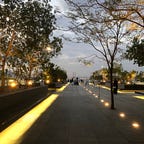Let’s Speak More Often
Although it seems like it, this isn’t an article about the benefits of travel. This is an article seeking to explain the comfort felt by muslim travelers, no matter how dutifully they observe all one or none of the five prayers of the day, when they hear the sound of Adhan when they come home.
Travel is essential. For an understanding of what we see as “other”, for an attempt to bring yourself closer to it and to bring your learning home. Through out the ages, that’s what our ancestors have done.
Travel was one of the most crucial elements of the golden age of Islam, wherein trade routes (and conquest, if you don’t mind me saying) were making exploration possible. It influenced everything. Mu’awiyah took his love of the opulent, all that Ummayad glamour, to Andalusia when he fled Damascus, and in all his homesickness, had the Great Mosque of Cordoba built. Literature, too, prospered. People travelled, and people translated what they read along the way or brought back home. Movement was key in the shift of mindset and in growth.
And of course, travel has always also been vital for an understanding of the self. It all still holds true today; perhaps, in this globalized world, it holds even truer. Because being in your box just isn’t cutting it anymore.
I’ve always sought the thrill of travel. A lot of people, young and old, can relate. For some reason, most of us feel this intrinsic need to go beyond ourselves and our borders. I’m fortunate enough that I had the opportunity to do so, especially in the last few years.
I was pulled first towards the West. Of course. The West has always been adept at marketing and selling. I already knew so much about the cities I visited that it was almost like watching a live-action film of a childhood cartoon. It gave tangibility to what I’d already heard, learnt and experienced through different channels — Hollywood obviously has a hand in this. But what I discovered was how little the other side knows about us. It’s not a challenge directed at the West. Perhaps its a shame on us. How can we get better at portraying how we really are?
Amongst the people I met in my travels, they always had more questions than I did about where I lived. The idea they began with was monumentally different from the impression I tried to give through my responses. Yes, I do wear what I’m wearing here over there. Yes, I do drive. It is safe. We have a Starbucks almost on every corner as well. We have a lot of Americans, in fact.
Aside from not being aware of the details, people also tended not to see the Middle East, Subcontinent, etc as a sum of many parts, parts that look vastly different from each other at times. But let’s not get into that.
When we try our hand at proactivity, conversation can put an end to misconceptions. Dialogue is the easiest and most effective way to exchange learning, and there is a unique pleasure in conversing with those who are not like you at all. But often, we don’t bother. Appearing remotely Muslim on the streets of bustling metropolises and small suburbs can earn you looks. In the cold, when my non-hijabi mother put a scarf around her head, we suddenly got a lot more attention.
I was in Tbilisi with a close friend from Dubai, who recoiled when I said Salam Alaikom out loud to “test the waters”. I’m not sure if people are actually afraid of us. But I’m sure we are afraid of people being afraid of us. It’s not that we fear a manifestation of racism— although sometimes it does manifest— what we fear is they might possibly, to some extent, at some level, be fearful of us.
It stems from not being known, not being understood. It’s frustrating to be misunderstood. It’s frustrating that someone would know nothing about your daily life, about the ambitions of your small cities, or the outlook of your large ones, and already have sort of made some large connections about you and your identity. Muslim. Backwards, for sure. Dangerous, possibly.
Even if they haven’t — even if they’re on holiday as well and actually live only a street behind your neighborhood mosque, or studied abroad for a semester in Sharjah and formed lasting relationships with people just like you — we’ve already assumed that they’ve assumed those things, and this chokehold of stereotyping sucks.
So after “feeling” scrutinized by strangers, we go ahead and do our shopping. We go see all the sights. When we speak to a friendly local, we assume he or she is more open-minded than his or her peers — and they assume the same about us.
But the truth may be that we’re all closed until the moment we open our mouths. So let’s speak more often.
We love the solace of coming home after a wonderful trip, and sighing with relief at the sound of the call to prayer. Every neighborhood has a mosque; you hear the Adhan five times a day. But God has been with you the whole time. Spiritual or not, religious or not, what you’re actually deriving comfort from is the sense of being understood. The relief from having to interpret — wrongly or rightly — glances from strangers. The relief of having nothing to prove simply because it’s already well-known.
